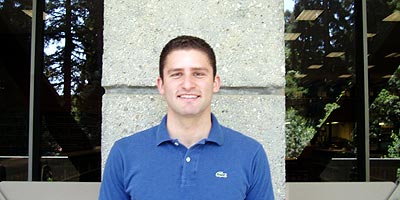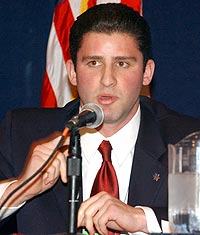UC Berkeley Web Feature
 |
Jesse Gabriel, political science major and University Medal finalist. |
Leadership depends on dialogue, says ex-ASUC president Jesse Gabriel
BERKELEY – Jesse Gabriel had an unusually precocious start to his career in political activism. At the age of four, while living in Israel's Negev Desert with his parents, he attended a demonstration in the West Bank. He didn't exactly march - he rode piggyback on his father's shoulders that time - but by a rally next year in Washington, D.C., he was participating under his own steam.
The University Medal
Finalists: |
A finalist for UC Berkeley's 2004 University Medal, he can usually be found in the thick of things. The political science major served as president of the Associated Students of the University of California (ASUC), the university's autonomous student government, during the 2002-03 school year, a time of heated campus activism over escalating violence between Israelis and Palestinians. He made it his mission to help begin meaningful dialogue between Muslim and Jewish student groups.
"Given who I am and my background, it was an especially interesting time for me to be ASUC president," Gabriel acknowledges. "Obviously, Israel is something I feel passionate about personally, but it was also important to me as president that Arab and Muslim students feel comfortable approaching me with their concerns. Another thing I could do as ASUC president was improve the campus climate and safety. A student who is identifiably Muslim should feel safe on the campus, just as should a student who is identifiably Jewish."
Listening and learning
He was a student representative on the UC Berkeley Middle East Issues Committee, which brought former Israeli Prime Minister Ehud Barak and Palestinian intellectual Edward Said to speak at two separate sold-out events at Zellerbach Hall. He worked with the committee to distribute $100,000 in challenge grants from the Office of the Chancellor to student groups and campus departments wanting to host dialogues around Middle Eastern issues. At the same time, Gabriel also worked to persuade the Muslim Student Association and Jewish Student Union to talk to each other about what kind of campus demonstrations were mutually acceptable, which eventually helped bring about the the creation of the campus's Committee on Hate & Bias.
In his letter recommending Gabriel for the University Medal, Chancellor Robert M. Berdahl wrote that "a sincere effort to better the world by acting responsibly and encouraging safe and open dialogue" were hallmarks of Gabriel's ASUC presidency.
 'A student who is identifiably Muslim should feel safe on the campus, just as should a student who is identifiably Jewish.' -Jesse Gabriel |
That effort comes from Gabriel's attachment to the principle of Judaism known as Tikkun Olam, which translates roughly as "repairing the world" and has been the bedrock of his activities. For a third-generation Cal student like Gabriel — his parents were married at the campus's Faculty Club before moving to Israel for four years — repairing the world starts first with UC Berkeley.
While ASUC president, Gabriel helped launch two new programs designed to improve students' experience on campus. To supplement understaffed university advising, he put together the Peer-2-Peer Student Advising Program, which trains students through a student-run DeCal class to help other students with choosing majors and outlining their academic path at the university. The peer advisers receive course credit instead of payment for their work. Working with Vice Provost Christina Maslach, Gabriel and ASUC Vice President for Academic Affairs Tony Falcone together launched the Student-Faculty Mentorship Program, matching students with professors for one-on-one interaction and career advice.
Both programs are still in their infancy, and Gabriel says he regrets not being able to see them blossom before he graduates. But running the ASUC, with its 105 student staff members and $20 million operating budget, is not a job that students can realistically handle more than one year. Add to that workload Gabriel's participation in resurrecting the Delta Chi fraternity on campus, maintaining a perfect 4.0 grade point average, working as a teaching assistant in the political science department, and one can understand why "there was definitely not much sleep, and there were a lot of personal sacrifices involved," as Gabriel admits.
And that's just his junior year - at other times, he's been a member of the UC Mock Trial team, tutored San Quentin inmates, been a staff writer for the Berkeley Political Review, and worked part-time in the university's Office of Government Affairs. Not only has he earned A's and A-pluses in every class, but he is working on an honors thesis exploring the potential for a Latino-Jewish political coalition in California. His adviser, the political science professor Bruce Cain, expects Gabriel's project to be "the definitive work on Latino-Jewish relations, and this from an undergraduate."
All work and no play
The frenetic pace of being ASUC president did take its toll, even on a student as preternaturally self-possessed and together as Gabriel.
"I learned many important lessons about leadership, running a big organization, and balancing a budget, but senior year, the year after I was president, also taught me a lot," he says. "I had to work hard to salvage relationships I had neglected. I got an advance look at how people get too involved in their careers and fail to budget time for for the things which really matter in life — most importantly friends and family." He has since found a balance that, he hopes, has made him "a better friend, boyfriend, brother and son."
Asked what advice he would give the incoming ASUC president, Gabriel laughs. "I have about two hours' worth of advice. The short version? Go out onto the balcony overlooking Lower Sproul at 3 o'clock every day and ask yourself, 'What have I done for these students today?' There are a lot of distractions with the presidency, a lot of partisanship to deal with, but you have to stay focused on the students. It's the only way to survive the year."
Although already accepted at Harvard Law School, Gabriel is first taking a year off. Of course, in typical Gabriel style, he won't be relaxing around his parents' house or heading to Europe. Instead, he's applied to teach high school in Washington, D.C. "I have this one year off and I'd like to do something different, along with doing a little Tikkun Olam," he shrugs. "I had a gift from the people of the state of California to attend this great university, and I just feel a responsibility to give back."
Eventually, after picking up a law degree, Gabriel thinks he'll end up back in politics, or perhaps international diplomacy. "One of the most direct ways to work for social justice is through politics, and a law degree is a very powerful tool in that field," says Gabriel. Chances are good that this already "highly successful diplomat and leader," as described by Dean of Students Karen Kenney, will find his way back into the complicated maelstrom of the Israel-Palestine debate.
"It's a very complicated situation there, but one that I think will be resolved," he says. "Just 20 years ago, it was inconceivable that Israel and Egypt, or Israel and Jordan, could make peace. Maybe I'm idealistic, but I absolutely believe there will be peace in the Middle East in my lifetime."


 University
Medalist Margaret Ann-Chia Chow urges new students
to make campus "feel like home"
University
Medalist Margaret Ann-Chia Chow urges new students
to make campus "feel like home" Leadership
depends on dialogue, says ex-ASUC president Jesse
Gabriel
Leadership
depends on dialogue, says ex-ASUC president Jesse
Gabriel From
Istanbul to Berkeley, Perin Gurel is on the
lookout for new challenges
From
Istanbul to Berkeley, Perin Gurel is on the
lookout for new challenges David
Young relies on faith and family to bring
his vision to life
David
Young relies on faith and family to bring
his vision to life Would-be
physician Maria Garcia gives back to the
Latin-American community
Would-be
physician Maria Garcia gives back to the
Latin-American community After
changing her major and her mind, Deann Del Rio
takes on modern medicine
After
changing her major and her mind, Deann Del Rio
takes on modern medicine